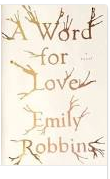by Alexandra Bowie
Bea, the narrator of Emily Robbins’ lovely and moving novel “A Word for Love,” has come to a foreign city – it’s never identified but must be Damascus – to study at the university. There’s an Arabic text about love, too, kept at the National Library, that she would like to read. The interplay between Bea’s bemused and bewildered response to the culture in a setting Robbins makes bright and vivid, and the effects, intentional and otherwise that she has on the people she encounters give rise to the themes of language and growth Robbins explores in this deeply engaging novel.
Life in the foreign city is confusing for Bea. She doesn’t always know or recognize words she hears, or, while speaking, find the one she needs. The National Library is frustrating, because Bea can’t crack the code that will get her the text she wants. The university ignores her. Instead of living independently, she boards with a local family. Madame, the mother, can be difficult, alternately generous and exacting, and the children demanding.
Bea has other adjustments to make: she shares a bed, and Madame limits where she can go, at first keeping her in the apartment. Soon Bea’s world widens to include the building’s garden, where she goes with Nisrine, the family’s Indonesian maid, and the children. Bea develops a crush on the blond policeman who works at the station across the way, but he has eyes only for Nisrine.
Baba, the father, who has spent time as a political prisoner, opens her world further by helping Bea find an Arabic tutor. For the first time Madame allows Bea to negotiate the city on her own. The tutor is charming, and Bea falls for him, just a little. But it’s enough, as Bea forgets Madame’s warning not to tell the tutor anything, because tutors must be licensed, which means they talk to the government.
Bea finds Arabic fascinating, she says, “for its precision, the way the words leafed out like spring from three-letter roots. In Arabic, there is a root for knowledge, and from this root, you can make the words for world and tenderness.” A crumbling wall, a love poem, a slip. Bea explores the language and imagery of love, in poems and in the daily life of the family. Despite Madame’s efforts Bea and Nisrine breach walls and distances, cultural and literal. All three must come to terms with the fact that even beautiful gardens harbor elements that sting, like bees. Or snakes.
Bea tells her story as an adult, looking back on her youthful experience, when her understanding of the relationships that surrounded her has deepened. We know from fairly early on that things ended badly and Bea returned home earlier than planned. It’s only as an adult that the underside of each relationship – where betrayals occurred, and where forgiveness might be possible – becomes evident to her. Don’t miss this nuanced and layered novel.
Have a book you want me to know about? Email me at asbowie@gmail.com. Follow me on Twitter @abowie917.



